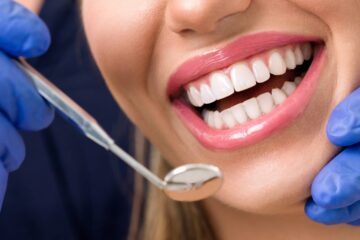Did you know that with proper care, dental veneers can last up to 15 years? As you’re considering this investment in your smile, it’s essential to understand what influences the lifespan of veneers.
In this article, you’ll discover the difference between porcelain and composite veneers, factors that impact their longevity, and tips for maintaining them. You’ll also learn about potential complications, so you’re fully informed before making a decision. Let’s help you get that long-lasting, perfect smile.
Key Takeaways
– Veneers can last 10 to 15 years with proper care, including regular brushing, flossing, and dental check-ups.
– The quality of the veneer application process, oral hygiene habits, and lifestyle factors can influence the lifespan of veneers.
– Porcelain veneers are more expensive but can last up to 15 years, while composite veneers may need replacement after 5 years.
– Maintaining veneer health requires gentle brushing, daily flossing, and avoiding foods high in sugar or acidity, as well as avoiding biting down on hard foods or objects.
Understanding Veneer Lifespan
When you’re considering investing in veneers, it’s crucial to understand that, on average, they can last anywhere from 10 to 15 years with proper care. However, their lifespan can be influenced by various factors like the quality of the veneer application process, your oral hygiene habits, and your lifestyle.
The veneer application process is a pivotal part of ensuring the longevity of your veneers. This process involves your dentist removing a small amount of enamel from your teeth, taking an impression of your teeth, and finally bonding the veneers to your teeth. The skill and precision of your dentist during this process can significantly influence how long your veneers last.
Maintaining good oral hygiene is also vital. Regular brushing, flossing, and dental check-ups will help you keep your veneers in top condition.
Your lifestyle can also affect veneer longevity. If you’re a smoker or have habits like teeth grinding, your veneers may not last as long.
Porcelain Vs Composite Veneers
You’ll notice significant differences in lifespan, appearance, and cost between porcelain and composite veneers.
In a veneer cost comparison, porcelain veneers are typically more expensive than their composite counterparts. This is due to the labour-intensive process of crafting each porcelain veneer individually. However, the higher initial cost can be offset by their longer lifespan. Porcelain veneers can last up to 15 years with proper care, whereas composite veneers may need replacement after 5 years.
In terms of appearance, porcelain veneers offer a more natural and translucent look, closely mimicking natural tooth enamel. Composite veneers, though less expensive, may not have the same level of aesthetic appeal.
The material safety analysis reveals that both types of veneers are considered safe. However, porcelain is a more durable material, resistant to staining and chipping compared to composite. This contributes to its extended lifespan.
Factors Influencing Veneer Longevity
In choosing between porcelain and composite veneers, it’s essential to understand various factors that can influence their longevity. Two critical elements to consider are the Veneer Material Quality and your Individual Oral Hygiene.
Veneer Material Quality plays a pivotal role in determining the lifespan of your veneers. High-quality porcelain veneers, renowned for their durability and resistance to staining, typically last longer than their composite counterparts. However, the quality of the veneer material is directly proportional to its cost, meaning higher quality often comes with a higher price tag.
Your Individual Oral Hygiene is another significant factor affecting veneer longevity. No matter how high the quality of your veneers, poor oral hygiene can lead to issues like gum disease and tooth decay, which can compromise the lifespan of your veneers. Regular brushing, flossing, and dental check-ups are essential for maintaining veneer health.
Maintenance Tips for Veneers
To extend the lifespan of your veneers, it’s crucial to follow a regular and thorough maintenance routine. This should include specific veneer cleaning techniques and dietary considerations.
Firstly, understanding and practising effective veneer cleaning techniques can greatly enhance their durability. Here are some essential tips:
– Brush your veneers gently twice a day using a soft toothbrush. Avoid hard-bristle brushes as they can damage the porcelain surface.
– Floss daily to remove food particles and plaque between your teeth and veneers.
– Regularly use an antiseptic mouthwash to keep your mouth free from bacteria that could degrade the bonding material of your veneers.
Dietary considerations also play a significant role in maintaining your veneers. Foods high in sugar or acidity can erode the enamel of your natural teeth and potentially damage your veneers. Additionally, avoid biting down on hard foods or objects to prevent chipping or cracking your veneers.
Remember, regular dental check-ups are vital for maintaining your veneers’ health and longevity. Your dentist can provide additional advice on veneer maintenance and promptly address any issues that may arise.
Potential Veneer Complications
Despite your best efforts to maintain your veneers, there may still be complications that can arise. One of the most common problems you may encounter is veneer discoloration. This is often due to the consumption of highly pigmented foods and drinks, such as coffee and red wine, or the use of tobacco products. If not dealt with promptly, the discoloration can become permanent.
Another issue you might face is chipping. Despite the durability of veneers, they aren’t impervious to damage. Accidents can happen, and your veneers can chip or crack. The chipping risks increase if you regularly eat hard foods, grind your teeth, or engage in contact sports without wearing a protective mouth guard.
While these complications can be concerning, they’re not inevitable. You can minimise the risk of discoloration by maintaining good oral hygiene and avoiding certain foods and drinks. To limit the risk of chipping, avoid biting hard substances and consider wearing a mouthguard if necessary. Regular check-ups with your dentist can also help detect any potential issues early on, helping to prolong the lifespan of your veneers.
Frequently Asked Questions
What Is the Procedure Like for Getting Veneers?
Getting veneers isn’t a walk in the park! You’ll have your teeth prepped, impressions taken, and then the veneers bonded. It’s essential to maintain them properly. Remember, there’re also alternatives to veneers available.
Can Veneers Be Whitened if They Get Stained or Discoloured?
No, you can’t whiten veneers if they’re stained or discoloured. The veneer material choice doesn’t change with teeth whitening. For veneer maintenance, it’s best to avoid staining foods and drinks.
How Do Veneers Feel Compared to Natural Teeth?
Veneers feel remarkably similar to natural teeth. You might initially notice a slight difference, but they’re designed to mimic your teeth’s feel. Veneers sensitivity varies, and maintenance is key to keep them comfortable.
Do Veneers Affect One’s Ability to Eat or Speak Normally?
Veneers don’t typically affect your ability to eat or speak normally. However, you might experience veneer sensitivity initially. Any durability concerns are often outweighed by the enhancement veneers provided to your smile.
Conclusion
Just like a well-maintained car can run for hundreds of thousands of miles, your veneers can last up to 15 years with proper care. Regular check-ups, good oral hygiene, and avoiding hard foods can help them go the distance. But remember, they’re not indestructible. The lifespan of veneers relies heavily on their care, just as the longevity of a car depends on its maintenance. Be diligent, and your veneers will keep your smile bright for years to come.





